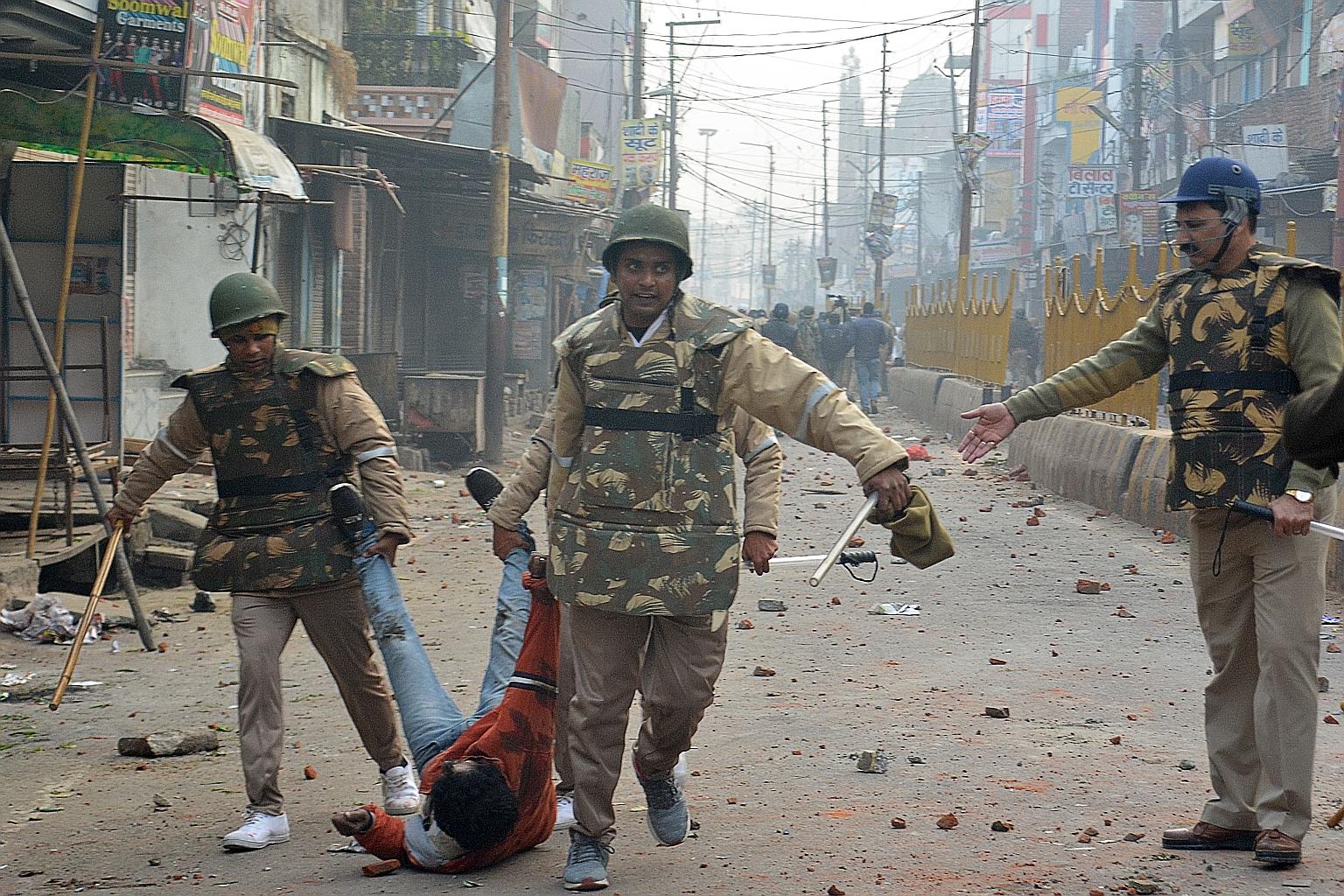Fear grips community after protests over citizenship Act in Uttar Pradesh
Sign up now: Get insights on Asia's fast-moving developments

Security personnel detaining a protester during demonstrations in Meerut against India's Citizenship Amendment Act on Dec 20. Five men were shot dead in what locals call police excesses.
PHOTO: AGENCE FRANCE-PRESSE
At Lisari Gate in the northern Indian city of Meerut, men sit in the narrow lanes outside their homes keeping watch at night.
Not against any criminal gang or group of thieves but because of the fear of arrests by police.
The locality, which falls within the central state of Uttar Pradesh, has been shaken by protests which police said turned violent over the Citizenship Amendment Act (CAA) on Dec 20.
Five men were shot dead in Lisari Gate in what locals call police excesses. The police have maintained that they did not shoot at protesters and that the men were part of an armed mob.
As investigations continue into what happened, trust in the police in this Muslim-dominated area is at an all-time low, adding to the worries over what the CAA means for Muslims.
"I stay awake at night and sleep during the day. The women sleep inside the house. And I sit with other men in the lane keeping vigil," said Mr Mohammed Wasim, 25, a scrap dealer.
Mr Wasim's brother Mohammed Mohsin was shot dead just a few metres from the house. "He had gone out to buy buffalo feed. He wasn't even part of the protests," said Mr Wasim, who makes barely enough to get by and now must support his brother's family.
India has seen countrywide protests against the CAA since it was passed in Parliament last month. The Act gives citizenship to non-Muslim illegal immigrants from Afghanistan, Pakistan and Bangladesh. This is to help persecuted minorities in those Muslim-majority countries, the government has claimed.
But critics said the Act, coupled with a possible citizenship drive to turf out illegal immigrants, violates India's secular Constitution by making citizenship religion-specific.
Uttar Pradesh, which is headed by Hindu controversial monk Yogi Adityanath, has seen some of the worst violence over the Act.
Of the 25 people killed nationwide over the past four weeks, 19 were from Uttar Pradesh, India's most populous state with a population of more than 200 million people. Most of those killed were Muslims, including an eight-year-old boy.
The police have denied allegations of excessive force, with the state government backing strong police action to curb the protests.
Warning of "badla" or revenge against protesters, Mr Adityanath has rolled out a much criticised plan to recover the costs of damage to public property from protesters.
In Meerut, the local administration is planning to recover 5 million rupees (S$94,000). So far, 36 people have been arrested.
"We have spoken to religious and political leaders of the area. We have said no innocent people will be arrested... If someone feels they are wrongly accused, they should reach out to us," said Senior Superintendent of Police Ajay Kumar Sahni. "The five people who were killed were with the mob. They were in the mood for stone pelting. Gunfire was going on. Everybody had pistols."
Police claim protesters died from their own gunfire. They have identified three men with guns and announced a reward of 20,000 rupees for finding them.
At the same time, videos have been circulating showing the police knocking out CCTVs in Meerut.
Lisari Gate, a predominantly Muslim locality, is a congested area where people live cheek by jowl.
Dozens of shops line narrow roads, which lead into even narrower lanes dotted with mostly dilapidated houses.
Education levels in the locality are low, with most people engaged in trade or as labourers.
The community is now gripped by fear. Roads which would normally be bustling with activity late into the night are empty by 9pm, said locals.
The fallout from the protests and crackdown is that people now voice their opposition to the CAA only among themselves.
"People are just scared here. Nothing can be said about what happens and when," said Mr Mohammed Shahid, 42, a cloth shop owner.
"There was no problem at all before this. But there have been no protests against the CAA since that day."


